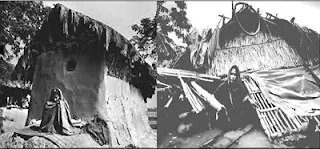A. Read the following text and answer the questions.
Meherjan lives in a slum on the Sirajgonj Town Protection Embankment.
Her polythene-roofed shelter looks like a cage. She is nearly 45 but looks more
than her age. In front of her shelter, she is trying to make a fire to cook the
day's only meal. Her weak hands tremble as she adds some fallen leaves and straw to the fire.
The whispering wind from the river Jamuna makes the fire unsteady. The dancing
flames remind Meherjan of the turmoil in her life.
Not long ago Meherjan had everything a family, cultivable land and
cattle. The erosion of the Jamuna gradually consumed all her landed property.
It finally claimed her only shelter during the last monsoon. It took the river
only a day to devour Meher's house, trees, vegetable garden and the bamboo
bush. She had a happy family once. Over the years, she lost her husband and her
family to diseases that cruel hunger and poverty brought to the family. Now,
she is the only one left to live on with the loss and the pain. The greedy
Jamuna has shattered her dreams and happiness.
There are thousand others waiting to share the same fate like
Meherjan. Bangladesh is a land of rivers, some of whose banks overflow or erode
during monsoon. Erosion is a harsh reality for the people living along the
river banks. During each monsoon many more villages are threatened by the
mighty rivers like the Jamuna, the Padma and the Meghna. It is estimated that
river erosion makes at least 100,000 people homeless every year in Bangladesh.
In fact, river erosion is one of the main dangers caused by climate change. If
we can't take prompt actions to adapt to climate change, there will be
thousands of more Meherjans in our towns and villages every year.
B. For each phrase below choose the meaning that is closest to
the meaning used in the text above.
1. In paragraph 3 'mighty rivers' mean
a rivers that have huge volumes of water and very strong currents
b rivers having many rowing boats in them
c rivers that make people cry out
d rivers that have strong banks
2. landed property
a a rented piece of land
b a piece of land on the bank of a river
c property in the form of a source of income to its owner
d property used only as an agricultural farm
3. whispering wind
a wind that blows from across the river
b wind that blows with a hissing sound c wind that helps someone make
a fire
d wind that blows in summer
4. dancing flames
a a traditional form of folk dance
b flames that make people dance around them
c flames that are made unstable by the blast of air
d flames made by people to remember their past
C. Ask and answer the following questions in pairs.
a. What does Meherjan use to make fire for cooking her meals?
b. What property did Meherjan lose due to river erosion?
c. What do you know about Meherjan's family?
d. In which season is river erosion most likely to occur?
e. Why is the phrase 'greedy Jamuna' used to describe the river? What
greed do you notice in the description?
D. Complete the summary of Meherjan's life with words/phrases from
the box.
Meherjan is a typical (1)............ woman who lives in a slum. She lost
her shelter and properties (2)............ the erosion of the river Jamuna. She
also lost her family. Her husband had
died of diseases caused by
poverty and (3)............ Now,
she is only a (4)............ Like Meherjan there are many people who have
become the (5)............ of river
erosion. River erosion is still posing (6)............to the lives and properties
of thousands of people. People living (7)............ the rivers are the most
likely victims of river erosion. Each year about (8)............ people become
homeless due to river erosion in Bangladesh. Meherjan's life is just one
(9)............ of how climate change (10)............
the lives of thousands of people.
victims
|
affects
|
close to
|
slum dweller
|
homeless
|
threats
|
example
|
due to
|
shortage of food
|
one lakh
|
E. Debate: Form two groups of 3/4. Decide which group will speak
for/against the motion given below. In your group, first, discuss and note down
five/six points to support/oppose the motion. Then select the speakers from
each group to start the debate.
Motion: Humans can't do anything to control the course of
nature.
If you want to read the next lesson of this unit please click the link below:
If you want to read the next lesson of this unit please click the link below:






0 Comments:
Post a Comment